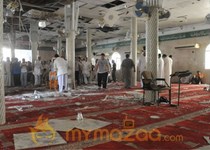ISIS claimed credit for a suicide bombing that killed as many as 20 at a mosque deep inside Saudi Arabia Friday, in what would be the terrorist group's first attack on the Kingdom's soil, The Wall Street Journal reported.
The suicide bomber –wearing an explosives-laden belt under his clothes—walked into the Imam Ali mosque in the village of al-Qudaih in the kingdom’s Eastern Province and attacked worshippers commemorating the birth of Imam Hussain, a revered figure among Shiites, Saudi Arabia’s Interior Ministry said.
Body parts and debris were scattered across the carpet in the mosque where worshippers had knelt to pray, Jafar al-Shayeb, a member of the municipal council told The Wall Street Journal.
A video posted online showed a hall filled with smoke and dust, with bloodied people moaning in pain on the floor, littered with concrete and glass. At least 90 people were wounded, the Saudi health minister told state television.
"We were doing the first part of the prayers when we heard the blast," worshipper Kamal Jaafar Hassan told Reuters by phone from the scene.
In a statement distributed on ISIS-linked Twitter feeds, a group purporting to be the ISIS branch in Saudi Arabia issued the claim. It could not be independently confirmed if the new group has operational links to the Islamic State group, based in Syria and Iraq, Reuters reported.
The group's statement carried a logo in Arabic referring to itself as the "Najd Province" -- a reference to the historic region that is home to the capital Riyadh and the ruling Al Saud family, as well as the ultraconservative Wahhabi branch of Islam.
Habib Mahmoud, managing editor for the state-linked Al-Sharq newspaper in Qatif, said that the local Red Crescent authorities confirmed to him that 19 people had been killed and 28 wounded.
The area is heavily populated by members of Saudi Arabia's Shiite minority.
It is the second deadly attack against Shiites in the kingdom in six months. In November, the extremist Islamic State group was accused of being behind the shooting and killing of eight worshippers in the eastern Saudi Arabian village of al-Ahsa.
Lebanon's Al-Manar television channel, run by the Lebanese Shiite Hezbollah group, carried still, blurry pictures of pools of blood inside what appeared to be the mosque where the attack took place. It also showed still photos of at least three bodies stretched out on red carpets, covered with sheets. One person dressed in a white robe was being carried away on a stretcher.
A local activist, Naseema al-Sada, told The Associated Press by telephone from Qatif that the local hospital has called on residents to donate blood.
Mahmoud, the newspaper editor, said the attacker stood with the worshippers during prayer and then detonated his suicide vest as worshippers were leaving the mosque.
Shiite residents in eastern Saudi Arabia have long complained of discrimination. They say that despite the region being home to most of the kingdom's oil reserves, their streets, buildings and infrastructure are in poor condition. They also say unemployment runs high among Shiite youth in the area.
In 2011, Shiites in the east inspired by the Arab Spring uprising in neighboring Bahrain took to the streets to demand greater rights. Police arrested hundreds of people and a counterterrorism court sentenced an outspoken cleric, Nimr al-Nimr, to death.
Qatif's residents say that Saudi Arabia's airstrikes against Shiite rebels in Yemen have further inflamed sectarian tensions. Since the Saudi-led war began in late March, many leading Sunni clerics in the kingdom have used Friday sermons to denounce the Houthi rebels and their Iranian backers, but also to criticize their practices of praying at tombs and shrines.
After the bombing, a few hundred people marched in mourning through the village, Mahmoud said.
"They are bewildered by this and hold those who are inflaming sectarian rhetoric, from those on social media and in the mosques, responsible," he said. "They mix what is Iranian and what is Shiite, and blame Shiites for Iranian actions in the region."
Many ultraconservative Sunni Muslims in Saudi Arabia, also known as Wahhabis, view the Shiite practice of praying at the tombs of religious figures as akin to polytheism.
The country's top cleric, Grand Mufti Abdel-Aziz al-Sheikh, told Saudi state television that the attack in Qatif aims at "driving wedge among the sons of the nation" and described it as "a crime, shame and great sin."
"I hold the government responsible," al-Sada said. "The government should protect us, not encourage sermons and schoolbooks to incite against us as non-believers."
"We want them to prevent this from happening in the first place," she said.
ISIS also claimed responsibility for a bomb attack at a Shiite Houthi mosque in the Yemeni capital of Sanaa Friday that wounded at least 13 people, a security source said.
ISIS said it was behind the explosion in a Twitter post, Reuters reported. "If there was an explosion it has already happened in Sanaa in the people's district in a Houthi mosque. The Islamic State claims responsibility,” the group said in the post.
Two of the 13 injured victims were in critical condition, a security official in Sanaa said.







